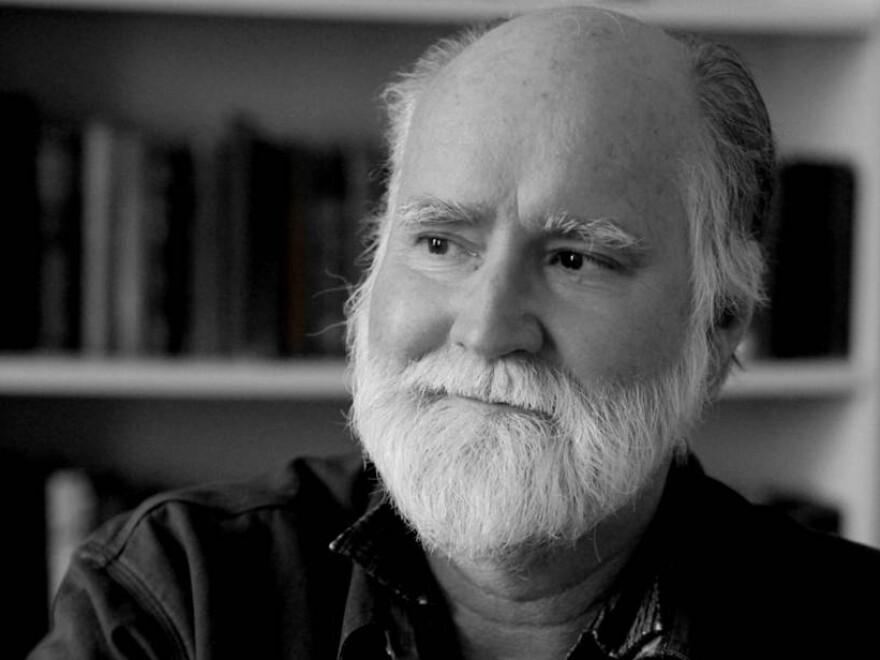Nicholson Baker has become a sort of poet of the particular and the peculiar. His books are filled with people who focus minutely on what captivates them – in other words, obsessives. A positive way of looking at obsession is as passion taken to an extreme. The danger, of course, is that the object of one person's intense fascination — such as the broken shoelaces in his unforgettable first novel, The Mezzanine, or the disquisitions on Debussy, dance music, and drones in his latest, Traveling Sprinkler — may spell another's total snore.
The good news about Baker's tenth novel is that it marks the return of Paul Chowder, the wacky, winning, lonely poet of minor renown who narrated Baker's 2009 novel, The Anthologist, an impassioned paean to rhyme, meter, and personality. The bad news is that Chowder is less entertaining on his new obsession, music, and borderline tiresome with his political rants.
This time around, Chowder is trying to write dance songs, love songs, protest songs — in part because "I realized I didn't want to write sad complicated poems, I wanted to write sad simple songs. In other words, I want to write sad poems that are made happier by being singable." Perhaps his songs will help in his ongoing quest to woo back Roz, his girlfriend who gave up on him and moved out of his Portsmouth, New Hampshire, home after eight years together. To Chowder's dismay, she has taken up with an opinionated Dartmouth doctor who "fancies himself a sort of Oliver Sacks, I think."
We're happy to learn that Only Rhyme, the poetry anthology whose introduction was causing Chowder so much trouble in The Anthologist, has actually done well and is still selling. Now he's spending less time in his white plastic chair on his driveway and more time at Planet Fitness and in his worse-for-wear but still beloved green Kia Rio car. He's given up alcohol but has taken up cigars as his "new tongue-loosening addiction." He comments charmingly, "What a disgusting habit. I love it," and reassures Roz, "It's just a phase. It's my brown period."
Puffing away, talking into an Olympus recorder, he rambles on about drone warfare; Quaker meetings; poet Archibald MacLeish's nefarious role in the creation of the CIA; bassoons; recording software and musical terminology; and Claude Debussy's prelude, The Sunken Cathedral, his favorite piece of music. (If ever a book should come with a soundtrack, CD, or embedded YouTube links, this is it.)

Traveling Sprinkler is "Chowder's Poetry Slurp" or "the Poetry Pebble Tumble," a jumbled, intermittently amusing, opinionated monologue filled with offbeat thoughts, music instruction and unabashed sentiment. "I feel like a traveling sprinkler that's gotten off the hose. I don't know where I'm going," he comments, one of many mentions of his favorite lawn tool, which he notes is the sort of brilliant invention "America did before it threw itself wholeheartedly into the making of weapons that kill everyone." A classic Chowder observation: His sprinkler "sprays in steady sixteenth notes. You can whistle Rossini to it if you want."
The best parts of Traveling Sprinkler involve the sweet, tentative relationship between Roz and Paul, two kind, quirky people with real heart. For his 55th birthday, he asks for one of her egg salad sandwiches — to be shared on a picnic — because "you really can't ask your former girlfriend for a guitar, even a cheap guitar. It's too momentous a present ... And of course you can't say, 'What I really want is I want you back,' either."
One thing is for sure: You don't read Nicholson Baker for plot. You read him for the way he wields his enviable vocabulary to capture the often hilarious and surprisingly intriguing and endearing mental machinations of his eccentric characters. You read him because, at his best, he makes you sit up and take notice of things you tend to overlook. And you read him for lines like, "My role is to be here in the side yard when the moon is swimming in the deep end of the sky with the treeshapes near it."
Copyright 2023 NPR. To see more, visit https://www.npr.org.
